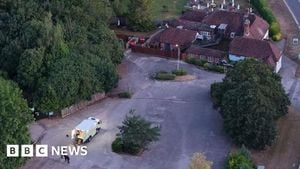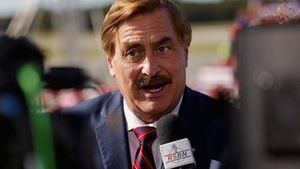The Naha City Mayoral Election held on January 26, 2024, brought significant political change as Daisuke Hanashiro, supported by the Liberal Democratic Party and Komeito, won the election to succeed the late Mayor Kuwae. This election was particularly important, not only as it addressed the continuity of the mayoral office following the mayor's untimely death but also because it underscored several pressing issues, including economic development and social welfare policies.
The election unfolded against the backdrop of Mayor Kuwae’s death, prompting voters to decide whether to maintain his policies or usher in new leadership. Hanashiro campaigned on the promise of continuing the deceased mayor’s administration, asserting, "I will absolutely carry forward Mayor Kuwae’s administration and assure the city’s progress," as reported by Okinawa Television.
Competing against Hanashiro was Mio Nakamura, whose backers included opposition parties such as the Constitutional Democratic Party and the Communist Party. Both candidates presented visions for Okinawa City, but the electorate largely favored Hanashiro's platform, which emphasized economic stability and the welfare of residents.
On election day, voter turnout was reported at 49.11%, representing a 3.97-point increase from the previous election's turnout of 45.14%. While this was seen as positive news, election officials noted it still ranked as the third lowest voter turnout historically for the city reflectively highlighting the need for greater civic engagement. Okinawa’s election management office indicated, "Although turnout improved, it remains one of the lowest we've experienced," emphasizing the challenge of stimulating greater interest among voters.
Leading up to election day, early voting saw increased participation, with over 2,000 individuals casting their ballots prior to January 26, accounting for 18.34% of registered voters—a notable increase compared to previous elections. This uptick signals heightened awareness and engagement from the community, as highlighted by local election officials who stated, "We have seen higher early voting this time, which reflects increased voter engagement."
With the successful election of Daisuke Hanashiro, the residents of Okinawa City now turn their attention to how he will fulfill his promises to continue the policies initiated by his predecessor. His vision undoubtedly focuses on building upon past successes to propel the city forward, especially amid the economic challenges facing many localities. Hanashiro's historical ties to the community, stemming from his time as both a local businessman and previous politician, position him uniquely to navigate these challenges.
Looking forward, Hanashiro has committed to engaging citizens and continuing dialogues on important community issues. His manifesto included plans for advancing economic development initiatives and enhancing social welfare programs, reflecting the priorities of his voter base. He is expected to outline his strategic plans during his inaugural address.
While the election results conveyed optimism for the future, they also served as a clear reminder of the necessity to galvanize voters and promote civic participation. The conversation around increasing voter turnout will be undeniable as Hanashiro starts his term and addresses the electorate's concerns and expectations.
Clearly, the Naha City Mayoral Election is more than just the election of one individual; it is about the future direction of Okinawa City and the shared vision of its residents. This electoral exercise emphasizes not only the importance of voting but also the relevance of elected officials being responsive to community needs. With Daisuke Hanashiro at the helm, the hope is for renewed vigor and engagement as the citizens of Okinawa look to shape their future together.



